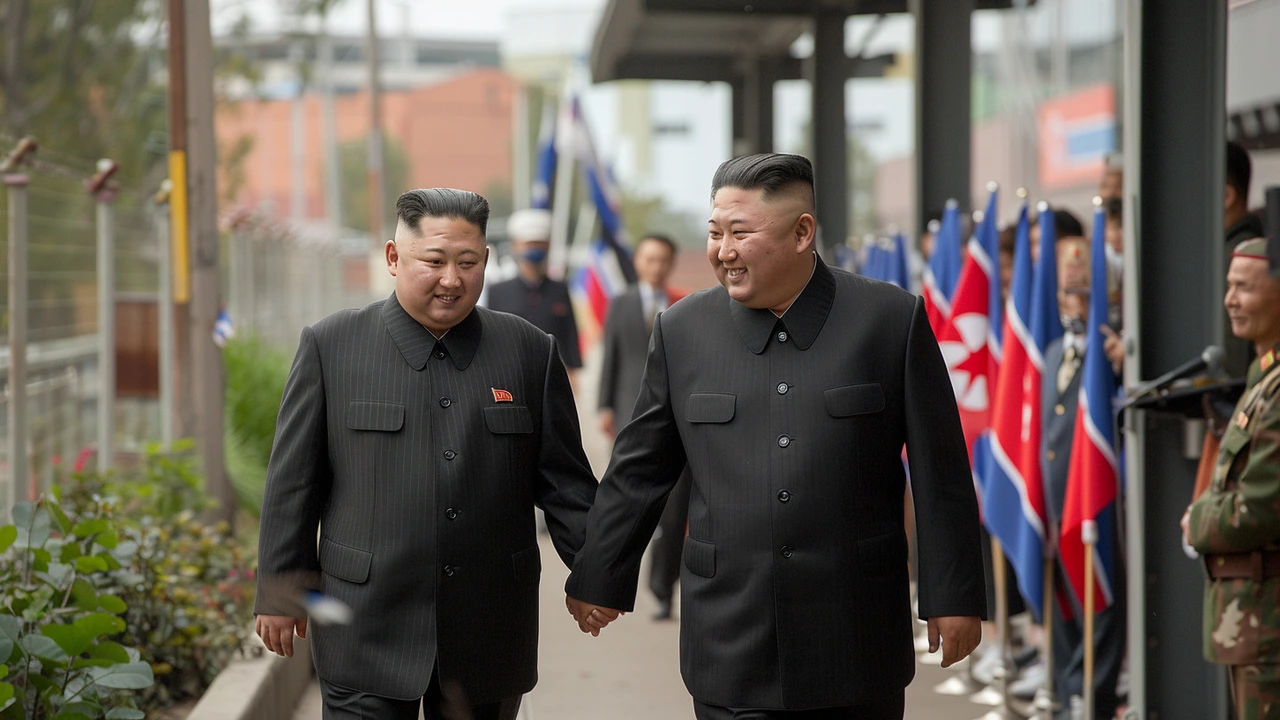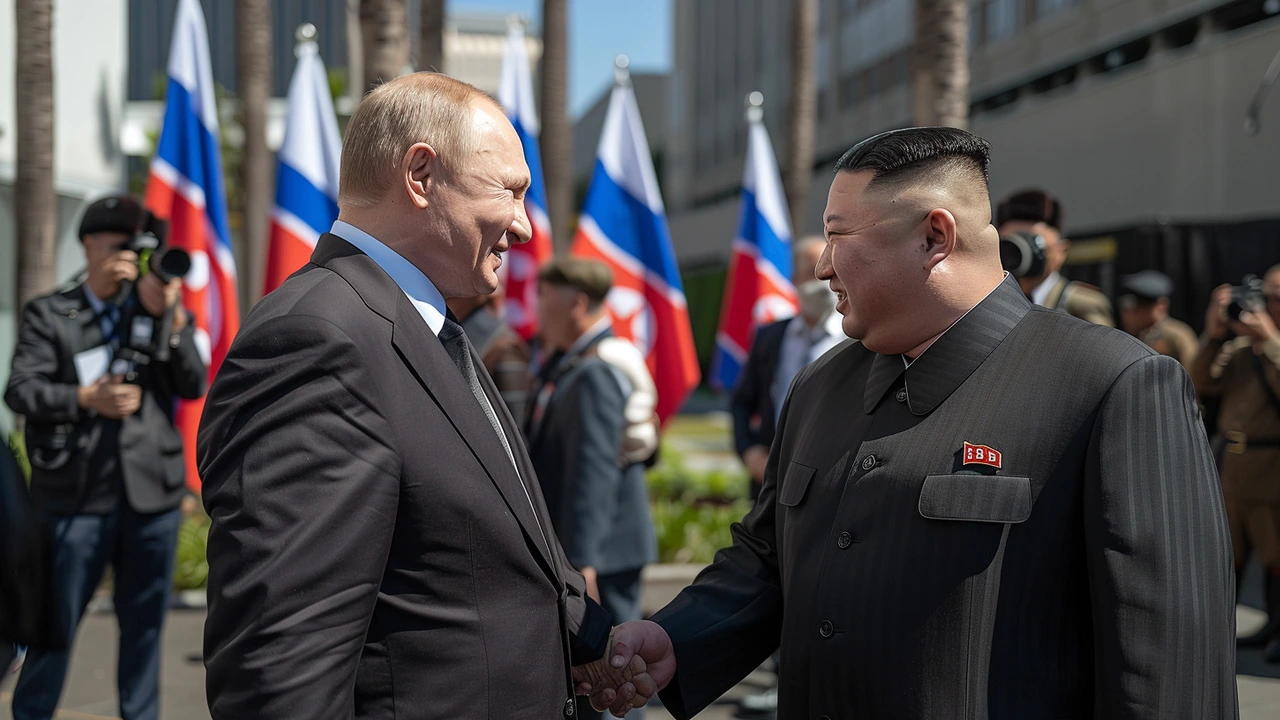Putin's North Korea Visit Marks Significant Shift in Global Diplomacy
Russian President Vladimir Putin is poised to make a rare and strategic visit to North Korea, the first in more than two decades. This monumental trip signals the growing partnership between Moscow and Pyongyang, founded on their mutual dislike for Western powers, and comes at a crucial time as international tensions continue to rise. The visit underscores the deepening alignment between the two nations, which has been driven by a series of geopolitical shifts and Putin’s ongoing war efforts in Ukraine.
Putin’s visit serves as a clear indication of his intentions to strengthen ties with North Korean leader Kim Jong Un. The two-day trip can be seen as a bold move to bolster support from North Korea as Russia faces increasing isolation from Western countries. The last time Putin visited North Korea was in 2000, when he met with Kim Jong Il, Kim Jong Un’s father. The significance of this trip cannot be overstated as it represents a continuum of Russia's efforts to solidify alliances with nations that share a common adversarial stance against the West.
Context and Timing of the Visit
This visit comes in the wake of a recent Group of Seven (G7) summit in Italy, where Western leaders reiterated their support for Ukraine and pledged to use profits from frozen Russian assets to facilitate a $50 billion loan to the war-torn country. The G7 meeting sent a clear message of unity and resolve among Western nations, which Putin appears keen to counterbalance by garnering support from allies like North Korea. The timing of the visit is thereby strategically aligned to offset the bolstered support Ukraine is receiving from Western powers, signaling a counter-move by Russia to gain international backing.
Observers have expressed growing concerns about the deepening military collaboration between Russia and North Korea, particularly amid allegations that Pyongyang is providing substantial military aid to Russia’s war efforts. Such collaborations raise numerous questions about the adherence to international sanctions and the potential for both countries to engage in activities that defy global norms. Despite these allegations, both countries have adamantly denied any significant military cooperation. Still, the international community remains wary of the potential implications of this emerging alliance.
Implications for Global Dynamics
The trip highlights the broader unfolding narrative of the geopolitical landscape where Russia is actively seeking alliances beyond its traditional spheres of influence. Following his visit to North Korea, Putin is scheduled to travel to Hanoi for another two-day trip aimed at reinforcing Russia's ties with Vietnam. This move is likely to provoke the United States, given Vietnam’s strategic importance in the Indo-Pacific region. The intensifying relations between Russia and countries like North Korea and Vietnam indicate a concerted effort by Putin to reassert his influence on the global stage amidst increasing pressures from the West.
Putin's recent diplomatic efforts extend beyond North Korea and Vietnam. His recent state visit to China and hosting foreign ministers from the BRICS nations underscore an ambitious strategy to weave a network of alliances that challenge the traditional Western-dominated world order. The BRICS group, consisting of Brazil, Russia, India, China, and South Africa, represents significant economic and political leverage, adding another layer to the strategic calculus of Putin's foreign policy.

North Korea’s Role in the Ukraine Conflict
North Korea's potential role as a military ally to Russia in the Ukraine conflict cannot be ignored. While concrete evidence of North Korean military aid has yet to surface conclusively, the possibility alone has drawn the ire of global watchdogs. Western nations, particularly the United States and South Korea, have voiced strong criticisms and warned of severe repercussions if any violations of international sanctions are proven. The mutual interests of Russia and North Korea appear to be converging at a point where both nations seek to defy international scrutiny and pursue their agendas with more audacity.
For Russia, North Korea offers a valuable partnership characterized by a shared vision of defiance against Western pressures. Kim Jong Un's regime, known for its reclusive policies and readiness to engage in brinkmanship, provides a somewhat ideal ally for Putin as he navigates the complexities of the international order. The isolated nature of North Korea's global standing also means that it can afford to engage in actions that other countries might shy away from due to diplomatic repercussions, thereby giving Putin a critical edge in his geopolitical chess game.
Western Response and Strategic Considerations
The United States and its allies are watching these developments with a keen eye, assessing the strategic implications of a strengthened Russia-North Korea axis. Besides military collaboration, the specter of economic and technological cooperation between the two could pose significant challenges to the existing sanctions regimes. For North Korea, gaining access to Russian technology and economic resources could mean a significant leap forward in its own developmental goals, particularly in areas such as military satellite programs and other advanced technologies.
This situation presents a nuanced challenge for Western foreign policy practitioners, who must balance the need for hardline stances against provocations with the imperative to avoid escalation into broader conflicts. Diplomatic channels remain open, but the rhetoric has taken on a firmer tone as the stakes continue to rise. The G7's unified front and financial commitments to Ukraine are indicative of the lengths to which Western nations are willing to go to thwart Russia's ambitions. This unity, however, will be put to the test as Russia’s alliances with non-Western nations evolve.

Future Prospects of Russia-North Korea Relations
The future of Russia-North Korea relations looks set to follow a trajectory of increasing collaboration. While the exact contours of this partnership will be shaped by the evolving geopolitical landscape, the foundations appear to be rooted in a mutual desire to push back against Western dominance. The personal rapport between Putin and Kim Jong Un seems to be a crucial element in this equation, with both leaders finding common ground in their political isolation and the strategic benefits of partnership.
As Putin's visit unfolds, it will be essential to monitor the announcements and agreements that emerge from the discussions. Any formal agreements, particularly those with military implications, will draw significant scrutiny and could serve as pivotal points for further action from the international community. The potential for collaborative initiatives in technology, infrastructure, and economic investments also holds the promise of reshaping regional dynamics in ways that could reverberate far beyond the immediate implications of the Ukraine conflict.
Conclusion
In summation, Putin’s impending visit to North Korea represents a watershed moment in the ongoing saga of international alliances and rivalries. It marks a deliberate effort by Russia to forge stronger ties with a regime that shares its anti-Western sentiments and stands willing to engage in mutually beneficial yet controversial actions. This visit is set against a backdrop of escalating conflicts and shifting alliances, making it a focal point for global diplomatic and strategic analyses in the times to come.
The ramifications of this visit are manifold, touching on areas of military, economic, and technological cooperation between the two nations. As the world watches closely, the outcomes of Putin's diplomatic endeavors will inevitably influence the strategies and responses of both allies and adversaries. The evolving dynamics of Russia-North Korea relations serve as a poignant reminder of the complexities and shifting tides of global politics in an era marked by deep ideological divides and contested sovereignties.
